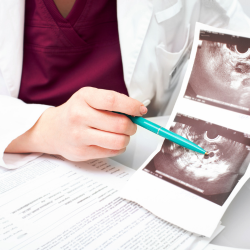Ovulation Study
Tracking ovulation cycles for better fertility planning.
Ovulation Study
The Ovulation Study is a series of ultrasound scans performed to track follicle development and confirm ovulation. It helps assess reproductive health and is useful for women trying to conceive.
Who Needs It?
- Women planning for pregnancy and tracking ovulation.
- Individuals undergoing fertility treatments like IUI or IVF.
- Women with irregular menstrual cycles or PCOS.
- Couples facing unexplained infertility .

Uses of Ovulation Study
Tracking Ovulation
Monitors the growth of ovarian follicles to predict ovulation.
Assessing Egg Quality
Evaluates follicle size and maturity for better fertility chances.
Identifying Ovulation Disorders
Detects conditions like anovulation or PCOS affecting fertility.
Fertility Treatment Guidance
Helps in scheduling IUI or IVF procedures at the right time
Preparation for Ovulation Study
N
Drink plenty of water before the scan, as a full bladder may be required for abdominal ultrasound.
N
Track your cycle to schedule scans at the right phase, usually between day 10 to day 16 of the menstrual cycle.
N
Avoid caffeine and smoking before the test to ensure accurate results.
N
For transvaginal ultrasound , empty your bladder just before the procedure.
N
Wear comfortable, loose clothing for convenience during the scan.
Frequently Asked Questions (FAQs)
What is the best time to do an ovulation study?
The study is usually conducted between day 10 to day 16 of the menstrual cycle, depending on cycle length.
How many scans are required in an ovulation study?
Multiple scans may be needed, usually every 2-3 days , until ovulation is confirmed.
Can an ovulation study detect pregnancy?
No, an ovulation study tracks follicle development and ovulation, but a pregnancy test is needed to confirm pregnancy.
Is the ovulation study painful?
The procedure is painless and non-invasive . A transvaginal ultrasound may cause slight discomfort but is generally well-tolerated.
